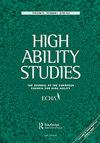An identity systems perspective on high ability in self-regulated learning
IF 1.3
4区 教育学
Q2 EDUCATION, SPECIAL
引用次数: 13
Abstract
ABSTRACT In this paper, we consider the theoretical implications of having high ability and being labeled as highly able to engagement in self-regulated learning. We frame this theoretical explication with the Dynamic Systems Model of Role Identity (DSMRI). The DSMRI depicts self-regulated learning as emerging from a complex dynamic system that integrates content knowledge and strategic knowledge with four role-based, contextually constructed, and interdependent components of the role identity of “student”: ontological and epistemological beliefs, purpose and goals, self-perceptions and self-definitions, and perceived action possibilities. These, in turn, emerge within a set of control parameters: the culture, social context, subject domain, and the individual’s implicit dispositions. We describe various ways by which high ability may manifest in these control parameters and influence the role-identity components, their relations, and their dynamic change, as they pertain to utilizing self-regulation strategies. For clarification, we also provide brief interview excerpts from honors college students that illustrate manifestations of role identity elements. We conclude by noting the implications of the DSMRI for future research and educational practice on students’ high ability and self-regulation.高自主学习能力的身份系统视角
摘要在本文中,我们考虑了具有高能力和被标记为高度能够参与自主学习的理论含义。我们用角色认同的动态系统模型(DSMRI)来构建这一理论解释。DSMRI将自我调节学习描述为从一个复杂的动态系统中产生的,该系统将内容知识和战略知识与“学生”角色认同的四个基于角色、情境构建和相互依存的组成部分相结合:本体论和认识论信念、目的和目标、自我感知和自我定义以及感知的行动可能性。这些反过来又出现在一组控制参数中:文化、社会背景、主题领域和个人的隐性倾向。我们描述了高能力可能在这些控制参数中表现出来并影响角色身份组成部分、它们的关系及其动态变化的各种方式,因为它们与利用自我调节策略有关。为了澄清,我们还提供了来自荣誉大学生的简短采访摘录,这些摘录说明了角色认同元素的表现。最后,我们注意到DSMRI对未来研究和教育实践对学生高能力和自我调节的影响。
本文章由计算机程序翻译,如有差异,请以英文原文为准。
求助全文
约1分钟内获得全文
求助全文
来源期刊

High Ability Studies
Multiple-
CiteScore
4.80
自引率
11.10%
发文量
7
期刊介绍:
High Ability Studies provides a forum for scholars in a variety of disciplines associated with the development of human abilities to their highest level. It is a medium for the promotion of high ability, whether through the communication of scientific research, theory, or the exchange of practical experience and ideas. The contents of this journal are unique in reflecting concerns and recent developments in this area from childhood and across the whole life span in a variety of contexts. Far from being restricted to the traditional focus on high-level cognitive development, it also presents investigations into all other areas of human endeavour, including sport, technology, the arts, business, management and social relations.
 求助内容:
求助内容: 应助结果提醒方式:
应助结果提醒方式:


